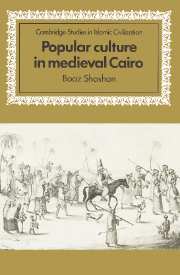Book contents
- Frontmatter
- Contents
- Preface
- List of abbreviations
- List of short references to frequently cited works
- Note on transcription and dates
- Introduction
- 1 Sufism and the people
- 2 Al-Bakrī's biography of Muḥammad
- 3 The festival of Nawrūz: a world turned upside down
- 4 The politics and “moral economy” of the Cairene crowd
- 5 Popular culture and high culture in medieval Cairo
- Appendix: Sufi shaykhs in Mamluk Cairo
- Notes
- Select bibliography
- Index
2 - Al-Bakrī's biography of Muḥammad
Published online by Cambridge University Press: 24 September 2009
- Frontmatter
- Contents
- Preface
- List of abbreviations
- List of short references to frequently cited works
- Note on transcription and dates
- Introduction
- 1 Sufism and the people
- 2 Al-Bakrī's biography of Muḥammad
- 3 The festival of Nawrūz: a world turned upside down
- 4 The politics and “moral economy” of the Cairene crowd
- 5 Popular culture and high culture in medieval Cairo
- Appendix: Sufi shaykhs in Mamluk Cairo
- Notes
- Select bibliography
- Index
Summary
“Liar and swindler (al-kadhdhāb, ad-dajjāl) … inventor of stories (wāḍi‘lqiṣaṣ)”, whose books, however, were read (or sold) in bookshops. This is how Shams ad-Dīn adh-Dhahabī (1274–1348), a Damascene historian, characterized Abū'l-Ḥasan al-Bakrī. He was not the only one to write about al-Bakrī in this manner. Other fourteenth-and fifteenth-century writers also evoked al-Bakrī's name in a clearly negative sense. lbn Kathīr (ca 1300–73), a Damascene also, mentioned Sīrat Dhī' l-himma wa'l-Baṭṭāl, Sīrat ‘Antar, al-Bakrī's biography of the Prophet (Sīrat al-Bakrī), and Sīrat ad-Danif, in one and the same stroke. He stressed that “the lies produced in al-Bakrī's sīra are an offence and a grave sin; their fabricator has fallen into the category of those warned by the Prophet: ‘He who reports lies about me deliberately shall be condemned to Hell.’” lbn Ḥajar al-‘Asqalānī (d. 1449), a leading Egyptian scholar, copied from adh-Dhahabī almost verbatim; to the works attributed to al-Bakrī he added what he considered al-Bakrī's most famous piece, the biography of the Prophet, already mentioned by lbn Kathlr. Al-‘Asqalānī also remarked that “there is not [by al-Bakrī] even one accurate description of a single one of Muhammad's expeditions (ma sāqa ghazwatan minhā ‘alā wajhihā); whatever al-Bakrī related was full of falsification, corruption, or additions”. Another Egyptian, al-Qalqashandī (1355–1418), chose al-Bakrī as an archetype of liars in his chapter on historically famous (or infamous) characters.
- Type
- Chapter
- Information
- Popular Culture in Medieval Cairo , pp. 23 - 39Publisher: Cambridge University PressPrint publication year: 1993



